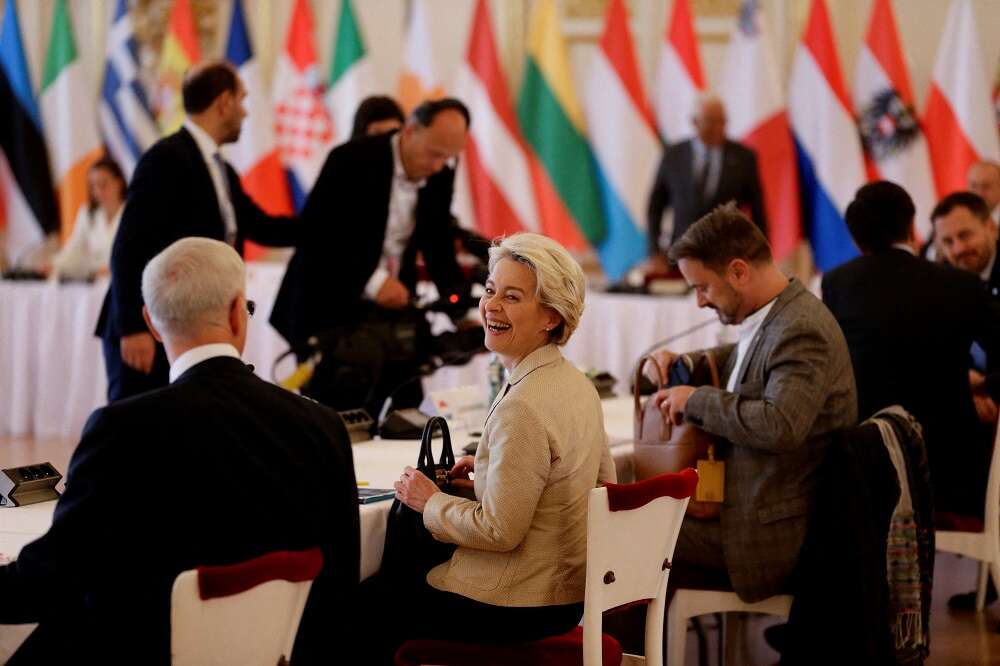
By Kate Abnett and Robert Muller
PRAGUE/BRUSSELS (Reuters) – The question of how, when and whether to cap gas prices loomed over another meeting of European Union countries on Wednesday, as they pursue a joint plan to target high gas prices – a compromise that has eluded them for weeks.
The 27-country EU is plotting its next move to tame soaring energy prices and shield consumers from surging bills, as Europe heads into a winter of scarce Russian gas, a cost of living crisis and the looming threat of recession.
EU energy ministers meeting in Prague will attempt to provide clearer instructions on what the European Commission should propose as the bloc’s next emergency energy measure.
“We’re all agreed we do need to do something further. The exact mechanisms may take some time,” Irish climate minister Eamon Ryan said.
EU energy commissioner Kadri Simson said Brussels would propose fresh measures next week, and any further EU-wide measures should be backed by “broad consensus” among countries.
So far, that has been hard to find.
With gas prices almost 90% higher than a year ago, most EU countries say they want a gas price cap, but disagree on its design – with a price cap on all gas, pipeline gas, or just gas used to produce electricity among the options countries have wrangled over in recent weeks.
“There is much more common ground than we had a few weeks ago,” Dutch climate minister Rob Jetten said on Wednesday.
Jetten said that countries had discussed the risks of decoupling gas and power prices – possibly through a programme similar to that of Spain and Portugal’s national scheme to cap the price of gas used for power generation – and it was now up to the Commission to find a proposal that all could agree on.
Spain and Portugal implemented their scheme in June, which helped curb local power prices. A senior EU official said support was building among members to roll it out EU-wide – although some warn it could raise gas demand across the bloc, since Spain’s gas use increased under the measure.
“Romania supports the decoupling of the price of electricity from the price of gas,” the country’s energy minister Virgil-Daniel Popescu said on his arrival to the meeting.
Russia has slashed gas deliveries to Europe since its invasion of Ukraine, blaming the cuts on Western sanctions imposed over the conflict.
That has driven up prices and left countries scrambling to secure alternative supplies. Germany and the Netherlands are among the countries opposed to a broad gas price cap, fearing it would leave Europe struggling to attract supplies from price-competitive global markets this winter.
The two countries put forward their own proposals ahead of Wednesday’s meeting – suggesting 10 “no-regret” EU measures, including a new benchmark price for liquefied natural gas, tougher gas-saving targets, and negotiating lower prices with suppliers such as Norway.
Norway’s energy minister Terje Aasland, who joined Wednesday’s meeting along with other European non-EU members, said his country “doesn’t recommend” a gas price cap.
EU countries have already rushed through emergency energy windfall profit levies, gas storage filling obligations, and electricity demand curbs to address the surge in energy prices driven by Russia slashing gas supplies.
But the pressure to agree more EU-wide measures has increased after Germany said it would spend up to 200 billion euros to shield its consumers and businesses from high energy costs – prompting a backlash from some countries about the uneven rollout of national support.
(Reporting by Kate Abnett, Robert Muller, Marine Strauss, Jason Hovet, Alan Charlish, Miranda Murray; Editing by John Chalmers, Tomasz Janowski and Louise Heavens)


